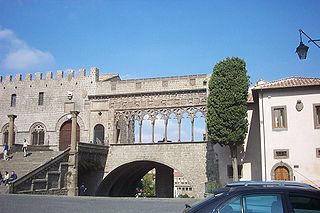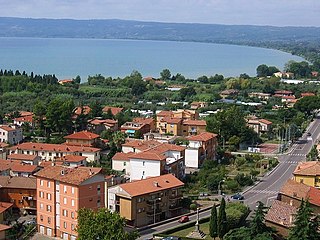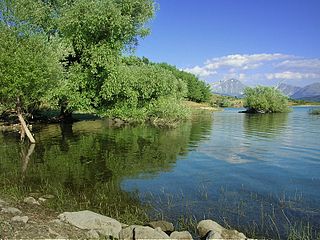
The province of Grosseto is a province in the Tuscany region of Italy. Its capital is the city of Grosseto. As of 2013 the province had a total population of 225,098 people.

Viterbo is a city and comune (municipality) in the Lazio region of Italy, the capital of the province of Viterbo.

The Via Clodia was an ancient high road of Italy. Situated between the Via Cassia and the Via Aurelia, it is different from them notably in that the latter was designed primarily for military long-haul, irrespective of settlements they met, but the Via Clodia was of short-range, intended for commercial traffic with the colonies in Etruscan lands.

The province of Viterbo is a province in the Lazio region of Italy. Its capital is the city of Viterbo.

Lake Bolsena is a lake of volcanic origin in the northern part of the province of Viterbo called Alto Lazio or Tuscia in central Italy. It is the largest volcanic lake in Europe. Roman historic records indicate activity of the Vulsini volcano occurred as recently as 104 BC; it has been dormant since then. The two islands in the southern part of the lake were formed by underwater eruptions following the collapse that created the depression.

Bolsena is a town and comune of Italy, in the province of Viterbo in northern Lazio on the eastern shore of Lake Bolsena. It is 10 km (6 mi) north-north west of Montefiascone and 36 km (22 mi) north-west of Viterbo. The ancient Via Cassia, today's highway SR143, follows the lake shore for some distance, passing through Bolsena. Bolsena is named "the city of the Eucharistic miracle" from which the solemnity of Corpus Domini had been extended to the whole Roman Catholic Church.
Latera is a small town and comune in the Province of Viterbo, Lazio, central Italy. Stephen Owen considers it to be an "archetypal" Italian hill town.

San Lorenzo Nuovo is a small town and comune in the province of Viterbo, in the Latium region of Italy. It is an agricultural center producing potatoes, olive oil, garlic, onions, cereals and grapes. A second source of revenue is tourism.
The Fanum Voltumnae was the chief sanctuary of the Etruscans; fanum means a sacred place, a much broader notion than a single temple. Numerous sources refer to a league of the "Twelve Peoples" (lucumonies) of Etruria, formed for religious purposes but evidently having some political functions. The Etruscan league of twelve city-states met annually at the Fanum, located in a place chosen as omphalos, the geographical and spiritual centre of the whole Etruscan nation. Each spring political and religious leaders from the cities would meet to discuss military campaigns and civic affairs and pray to their common gods. Chief amongst these was Voltumna, possibly state god of the Etruria.
Barbara Frale is an Italian paleographer at the Vatican Secret Archives. Frale has written books about the Templars and she has a special interest in the history of the Shroud of Turin. In September 2001, she found an authentic copy of the Chinon Parchment.

The Ministry of Economy and Finance, also known by the acronym MEF, is a ministry of the Italian government. Its responsibilities include overseeing economic policy, public investments and spending. The Ministry's headquarters are located in Rome's historic Palazzo delle Finanze. The current minister in the Meloni Cabinet is Giancarlo Giorgetti.
Attilio Celant, 2nd Class / Grand Officer of the Order of Merit of the Italian Republic, is an Italian economist, geographer and academic.

Tourism in Abruzzo has become one of the most prosperous sectors in the economy of Abruzzo, and in recent years has seen a remarkable growth attracting numerous tourists from Italy and Europe. According to statistics, in 2021 arrivals totaled 1,330,887. A total of 5,197,765 arrivals were tourists, a figure that puts the region seventeenth among the Italian regions for numbers of tourists per year. A moderate support to tourism is also given to the Abruzzo Airport with many low cost and charter flights connecting the entire region with the rest of Europe.

The Italian Society of Silviculture and Forest Ecology, established in 1995, is a non-profit cultural association promoting the diffusion of scientific forest culture in Italy, and all over the world.
Istituto per lo Sviluppo Economico dell'Italia Meridionale S.p.A., known as ISVEIMER, is a former Italian bank based in Naples, Campania. The bank was in liquidation since 1996, which the headquarter of the company was relocated to Rome. However, due to the subsidized loan, the company was still in wind-down phase as in 2015.

A Ministry of the Republic of Italy is an administrative organ of the Republic of Italy, placed at the top of Italian public administration and is characterised by one or more specific competencies, with an organised structure, often varying over time.

Over the years, Abruzzo has become the most industrialized region of southern Italy and has had significant improvements and growth also at an economic level; the region has reached and surpassed many Italian regions in the specialization of the various industrial sectors and today it is the richest of the regions of Southern Italy.

The Monte Camulera is a mountain of the Ligurian Prealps, the eastern section of the Ligurian Alps.

Mount Cimino is the highest peak in Lazio's Anti-Apennine chain of the Cimini Mountains, and in the entire province of Viterbo. It towers above the town of Soriano nel Cimino.
















